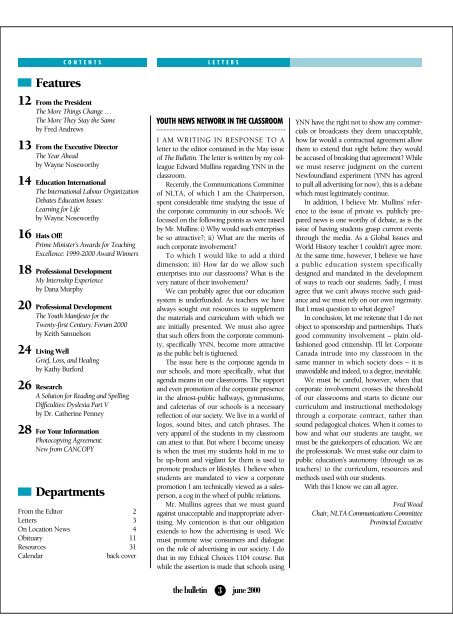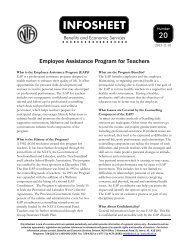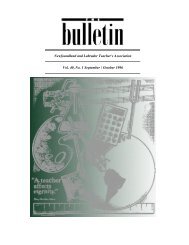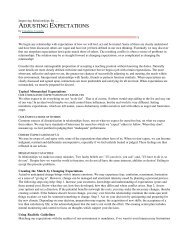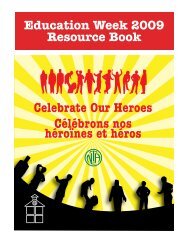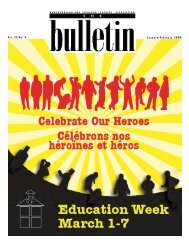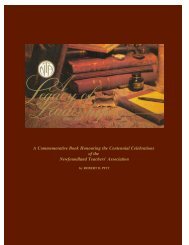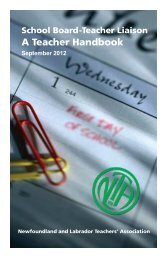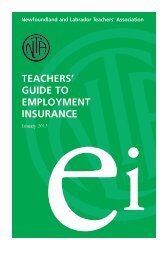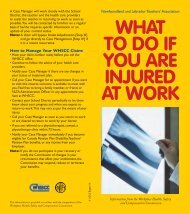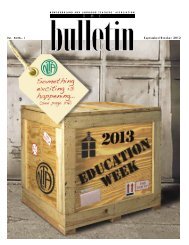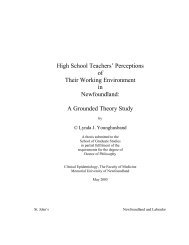June/2000 - Newfoundland and Labrador Teachers' Association
June/2000 - Newfoundland and Labrador Teachers' Association
June/2000 - Newfoundland and Labrador Teachers' Association
- No tags were found...
Create successful ePaper yourself
Turn your PDF publications into a flip-book with our unique Google optimized e-Paper software.
CONTENTSLETTERSFeatures12 From the PresidentThe More Things Change …The More They Stay the Sameby Fred Andrews13 From the Executive DirectorThe Year Aheadby Wayne Noseworthy14 Education InternationalThe International Labour OrganizationDebates Education Issues:Learning for Lifeby Wayne Noseworthy16 Hats Off!Prime Minister’s Awards for TeachingExcellence: 1999-<strong>2000</strong> Award Winners18 Professional DevelopmentMy Internship Experienceby Dana Murphy20 Professional DevelopmentThe Youth Manifesto for theTwenty-first Century: Forum <strong>2000</strong>by Keith Samuelson24 Living WellGrief, Loss, <strong>and</strong> Healingby Kathy Burford26 ResearchA Solution for Reading <strong>and</strong> SpellingDifficulties: Dyslexia Part Vby Dr. Catherine Penney28 For Your InformationPhotocopying Agreement:New from CANCOPYDepartmentsFrom the Editor 2Letters 3On Location News 4Obituary 11Resources 31Calendarback coverYOUTH NEWS NETWORK IN THE CLASSROOMI AM WRITING IN RESPONSE TO Aletter to the editor contained in the May issueof The Bulletin. The letter is written by my colleagueEdward Mullins regarding YNN in theclassroom.Recently, the Communications Committeeof NLTA, of which I am the Chairperson,spent considerable time studying the issue ofthe corporate community in our schools. Wefocused on the following points as were raisedby Mr. Mullins: i) Why would such enterprisesbe so attractive?; ii) What are the merits ofsuch corporate involvement?To which I would like to add a thirddimension: iii) How far do we allow suchenterprises into our classrooms? What is thevery nature of their involvement?We can probably agree that our educationsystem is underfunded. As teachers we havealways sought out resources to supplementthe materials <strong>and</strong> curriculum with which weare initially presented. We must also agreethat such offers from the corporate community,specifically YNN, become more attractiveas the public belt is tightened.The issue here is the corporate agenda inour schools, <strong>and</strong> more specifically, what thatagenda means in our classrooms. The support<strong>and</strong> even promotion of the corporate presencein the almost-public hallways, gymnasiums,<strong>and</strong> cafeterias of our schools is a necessaryreflection of our society. We live in a world oflogos, sound bites, <strong>and</strong> catch phrases. Thevery apparel of the students in my classroomcan attest to that. But where I become uneasyis when the trust my students hold in me tobe up-front <strong>and</strong> vigilant for them is used topromote products or lifestyles. I believe whenstudents are m<strong>and</strong>ated to view a corporatepromotion I am technically viewed as a salesperson,a cog in the wheel of public relations.Mr. Mullins agrees that we must guardagainst unacceptable <strong>and</strong> inappropriate advertising.My contention is that our obligationextends to how the advertising is used. Wemust promote wise consumers <strong>and</strong> dialogueon the role of advertising in our society. I dothat in my Ethical Choices 1104 course. Butwhile the assertion is made that schools usingYNN have the right not to show any commercialsor broadcasts they deem unacceptable,how far would a contractual agreement allowthem to extend that right before they wouldbe accused of breaking that agreement? Whilewe must reserve judgment on the current<strong>Newfoundl<strong>and</strong></strong> experiment (YNN has agreedto pull all advertising for now), this is a debatewhich must legitimately continue.In addition, I believe Mr. Mullins’ referenceto the issue of private vs. publicly preparednews is one worthy of debate, as is theissue of having students grasp current eventsthrough the media. As a Global Issues <strong>and</strong>World History teacher I couldn’t agree more.At the same time, however, I believe we havea public education system specificallydesigned <strong>and</strong> m<strong>and</strong>ated in the developmentof ways to reach our students. Sadly, I mustagree that we can’t always receive such guidance<strong>and</strong> we must rely on our own ingenuity.But I must question to what degree?In conclusion, let me reiterate that I do notobject to sponsorship <strong>and</strong> partnerships. That’sgood community involvement – plain oldfashionedgood citizenship. I’ll let CorporateCanada intrude into my classroom in thesame manner in which society does – it isunavoidable <strong>and</strong> indeed, to a degree, inevitable.We must be careful, however, when thatcorporate involvement crosses the thresholdof our classrooms <strong>and</strong> starts to dictate ourcurriculum <strong>and</strong> instructional methodologythrough a corporate contract, rather thansound pedagogical choices. When it comes tohow <strong>and</strong> what our students are taught, wemust be the gatekeepers of education. We arethe professionals. We must stake our claim topublic education’s autonomy (through us asteachers) to the curriculum, resources <strong>and</strong>methods used with our students.With this I know we can all agree.Fred WoodChair, NLTA Communications CommitteeProvincial Executivethe bulletin 3 june <strong>2000</strong>


